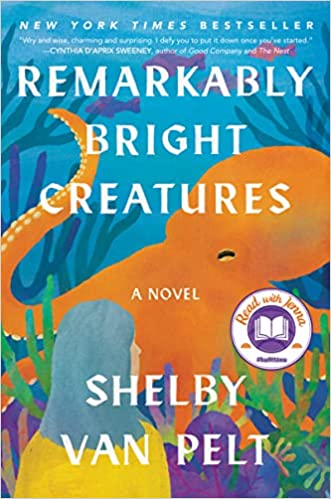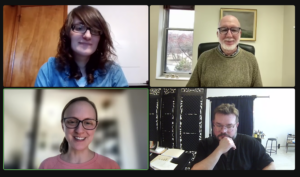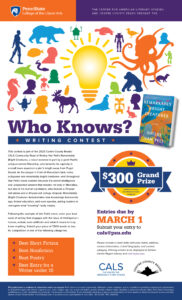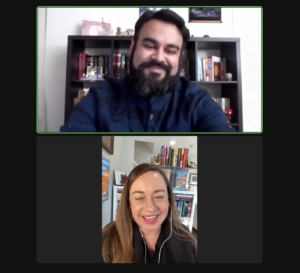Readers Dive Deep into Shelby Van Pelt’s “Remarkably Bright Creatures” with 2023 Centre County Reads Programming

From January to March, community members “submerged” themselves in the 2023 Centre County Reads programming for Shelby Van Pelt’s Remarkably Bright Creatures.
The heartwarming novel centers around Tova, a lonely aquarium worker who struggles to accept her son’s mysterious disappearance decades prior. A giant Pacific octopus named Marcellus helps Tova discover the truth about her son and accept companionship from others—including a 30-year-old newcomer named Cameron who’s trying to understand life’s purpose and locate his place in the world after a turbulent childhood with unanswered questions about his parentage.
With its themes of family, loss, loneliness, and redemption, Remarkably Bright Creatures appealed to local readers of all ages and inspired them to participate in the robust slate of Centre County Reads programming outlined below.
“Giving Voice to Animals” Roundtable Event
On Wednesday, Feb. 15, CALS hosted a virtual roundtable event, “Giving Voice to Animals,” that featured University of Wisconsin-Milwaukee Professor of History Nigel Rothfels, Bard College Writer in Residence Benjamin Hale, and Penn State Professor of Media Studies Jessica Myrick as panelists. CALS Graduate Research Assistant and event moderator Jess Rafalko introduced the speakers and posed questions about representing nonhuman creatures in literature and media.

Rothfels kicked off the discussion and explained that many novels “pre-date” Remarkably Bright Creatures and “focus on animal vocalizations,” ranging from Aesop's Fables to Anna Sewell’s Black Beauty. Rothfels said this genre of literature “gives us an entry point to understanding animals better.” From her own research into people’s “fascination” with animal-related content, Myrick explained the genre allows people “to connect with others” over a common interest. Although people are constantly bombarded with media messages, Myrick said animal-focused content tends to be “really uniting,” connecting diverse groups over a mutual appreciation and fascination for animals. Meanwhile, Hale inspired the audience to consider the philosophical differences between animal species with regard to “nonhuman consciousness.”
During the Q&A segment, the panelists discussed the ethical implications of portraying animals in media. Although these portrayals can help audiences better understand other species, the panelists acknowledged the potential negative effects. For instance, after One Hundred and One Dalmatians was released in 1961, viewers began adopting the highly energetic dog breed without considering their ability to care for the pets. At the conclusion of the event, attendees left with a better understanding about the implications—both positive and negative—of portraying animals in media.
Remarkably Bright Creatures Book Discussions
The Centre County Library System hosted numerous book discussion groups for Remarkably Bright Creatures both virtually and in-person. Although some discussion participants said they wouldn’t have initially picked Remarkably Bright Creatures off the library shelf, many expressed enjoyment for the book overall. Participants who listened to the audiobook noted that the narrators added to their experience of the story by more deeply immersing them in the narrative. As one discussion host, Brady Clemens, put it, the “power of a good narrator can’t be understated.”
Many discussion groups focused on the novel’s complex character development, emphasizing Cameron’s increased maturity, Tova’s acceptance of history, and Marcellus’s return to his environment. The attendees also discussed the book’s themes, such as isolation, relationship building, captivity, the complexities of aging, and intelligence. Maria Burchill, who led the Schlow Library Book Discussion in February, emphasized that the book delved into the question, “What is it like to be something that you are not?” Attendees grappled with questions surrounding pacing and plot developments. Some participants felt the story’s mystery resolved too quickly; however, others enjoyed the “little clues” sprinkled throughout the narrative.
Participants drew connections between Remarkably Bright Creatures and comparable media works like Fredrick Backman’s Anxious People. Many attendees positively viewed the novel as “a Hallmark movie with an octopus thrown in” and sought literature with comparable “themes” afterwards.
My Octopus Teacher Film Talk and Other Events

Additional programming encouraged readers to explore the ideas and themes of Remarkably Bright Creatures beyond the context of the book itself. On Friday, March 3, the Centre County Library and Historical Museum hosted a virtual My Octopus Teacher Film Talk, discussing the 2020 documentary about a filmmaker’s relationship with an octopus off the South African coast. The group discussed the documentary film genre and the authenticity of capturing videos that showcase underwater environments. The film provoked viewers to consider the implications of interfering with animals to capture video content, stirring debate about the extent to which the videographer should have interacted with the underwater environment.
Most group members enjoyed watching the octopus interact with the human over time, forming a relationship and trustworthy connection—similar to the one described in Remarkably Bright Creatures between Marcellus and Tova. However, some attendees voiced conflicting opinions about the film’s effectiveness in “conserv[ing] the kelp forests” of Africa, where many aquatic creatures thrive. The event’s moderator noted that “this discussion has been the most talkative our group has been about a film, and it’s because of an octopus.”
Community members could engage with the Centre County Reads programming through other creative opportunities. The Holt Memorial Library distributed a Yarn Octopus Take and Make activity for teens, while the Centre County Library & Historical Museum hosted a Craft and Chat event on Wednesday, Feb. 22.
The Centre County Reads program also hosted a writing contest inspired by the novel. The “Who Knows?” writing contest sought work that grappled with “the issue of intelligence—human, animal, even artificial—and what it means to truly know anything.” Winning entries can be read online here, or in hard copy at the Schlow Centre Region Library in downtown State College.
Shelby Van Pelt Author Visit
Shelby Van Pelt, the author of Remarkably Bright Creatures, participated in a virtual discussion on Tuesday, March 14, answering community questions about the novel and her creative process. At the beginning of the event, Van Pelt explained her lengthy journey of writing the novel—a process that began after she watched a YouTube video of a giant octopus attempting to escape its enclosure. At the beginning of her writing process, Van Pelt described Marcellus as “a fully participatory character [with] his own character and his own growth.” Rather than being a planner, Van Pelt described her writing style as being a “pants-er,” or someone who “flies by the seat of their pants.” Since this was her first novel, Van Pelt said she “had no expectation that anyone would read her book,” which was “very freeing” during the initial stages of the project.
After spending time writing, Van Pelt explained how it “dawned” on her that “this was a story about people at its heart” and not just a narrative from an octopus’s perspective. To gain character inspiration during the pandemic, Van Pelt described how she based Tova’s character on her own grandmother who “always kept busy” completing “little projects” like “a bumble bee never sitting still.” As a mother of young children, Van Pelt discussed how motherhood and caregiving appeared as frequent themes within her work and guided Tova’s character arc.
Van Pelt’s novel also addresses the challenges for caring for elderly members in society and the balance of giving and receiving aid. Tova experiences “emotional constraints” that originate from her fear of being a “burden” as she ages, and she consequently grapples with accepting help from others. Van Pelt explained that she wanted “an imperfect happy ending” for the novel, since “that’s real life, and life moves on.” This influenced her decision to allow Tova to lose her familial home, which sparked criticism from some readers.

To conclude her visit, Van Pelt read an excerpt from her novel, “Day 1,309 of My Captivity,” which she classified as a “fan favorite” and a “personal favorite scene” that almost ended up on the “chopping block” in the book’s editing process.
Although Van Pelt said she “never thought [Remarkably Bright Creatures] would be a novel one day,” community members swarmed into the Centre County Reads programming to energetically converse about her debut. As blizzardous weather hit the area this winter, Centre County Reads allowed community members to unite in their literary appreciation and “extend a tentacle” toward understanding octopus species like Marcellus.

From January to March, community members “submerged” themselves in the 2023 Centre County Reads programming for Shelby Van Pelt’s Remarkably Bright Creatures.
The heartwarming novel centers around Tova, a lonely aquarium worker who struggles to accept her son’s mysterious disappearance decades prior. A giant Pacific octopus named Marcellus helps Tova discover the truth about her son and accept companionship from others—including a 30-year-old newcomer named Cameron who’s trying to understand life’s purpose and locate his place in the world after a turbulent childhood with unanswered questions about his parentage.
With its themes of family, loss, loneliness, and redemption, Remarkably Bright Creatures appealed to local readers of all ages and inspired them to participate in the robust slate of Centre County Reads programming outlined below.
“Giving Voice to Animals” Roundtable Event
On Wednesday, Feb. 15, CALS hosted a virtual roundtable event, “Giving Voice to Animals,” that featured University of Wisconsin-Milwaukee Professor of History Nigel Rothfels, Bard College Writer in Residence Benjamin Hale, and Penn State Professor of Media Studies Jessica Myrick as panelists. CALS Graduate Research Assistant and event moderator Jess Rafalko introduced the speakers and posed questions about representing nonhuman creatures in literature and media.

Rothfels kicked off the discussion and explained that many novels “pre-date” Remarkably Bright Creatures and “focus on animal vocalizations,” ranging from Aesop's Fables to Anna Sewell’s Black Beauty. Rothfels said this genre of literature “gives us an entry point to understanding animals better.” From her own research into people’s “fascination” with animal-related content, Myrick explained the genre allows people “to connect with others” over a common interest. Although people are constantly bombarded with media messages, Myrick said animal-focused content tends to be “really uniting,” connecting diverse groups over a mutual appreciation and fascination for animals. Meanwhile, Hale inspired the audience to consider the philosophical differences between animal species with regard to “nonhuman consciousness.”
During the Q&A segment, the panelists discussed the ethical implications of portraying animals in media. Although these portrayals can help audiences better understand other species, the panelists acknowledged the potential negative effects. For instance, after One Hundred and One Dalmatians was released in 1961, viewers began adopting the highly energetic dog breed without considering their ability to care for the pets. At the conclusion of the event, attendees left with a better understanding about the implications—both positive and negative—of portraying animals in media.
Remarkably Bright Creatures Book Discussions
The Centre County Library System hosted numerous book discussion groups for Remarkably Bright Creatures both virtually and in-person. Although some discussion participants said they wouldn’t have initially picked Remarkably Bright Creatures off the library shelf, many expressed enjoyment for the book overall. Participants who listened to the audiobook noted that the narrators added to their experience of the story by more deeply immersing them in the narrative. As one discussion host, Brady Clemens, put it, the “power of a good narrator can’t be understated.”
Many discussion groups focused on the novel’s complex character development, emphasizing Cameron’s increased maturity, Tova’s acceptance of history, and Marcellus’s return to his environment. The attendees also discussed the book’s themes, such as isolation, relationship building, captivity, the complexities of aging, and intelligence. Maria Burchill, who led the Schlow Library Book Discussion in February, emphasized that the book delved into the question, “What is it like to be something that you are not?” Attendees grappled with questions surrounding pacing and plot developments. Some participants felt the story’s mystery resolved too quickly; however, others enjoyed the “little clues” sprinkled throughout the narrative.
Participants drew connections between Remarkably Bright Creatures and comparable media works like Fredrick Backman’s Anxious People. Many attendees positively viewed the novel as “a Hallmark movie with an octopus thrown in” and sought literature with comparable “themes” afterwards.
My Octopus Teacher Film Talk and Other Events

Additional programming encouraged readers to explore the ideas and themes of Remarkably Bright Creatures beyond the context of the book itself. On Friday, March 3, the Centre County Library and Historical Museum hosted a virtual My Octopus Teacher Film Talk, discussing the 2020 documentary about a filmmaker’s relationship with an octopus off the South African coast. The group discussed the documentary film genre and the authenticity of capturing videos that showcase underwater environments. The film provoked viewers to consider the implications of interfering with animals to capture video content, stirring debate about the extent to which the videographer should have interacted with the underwater environment.
Most group members enjoyed watching the octopus interact with the human over time, forming a relationship and trustworthy connection—similar to the one described in Remarkably Bright Creatures between Marcellus and Tova. However, some attendees voiced conflicting opinions about the film’s effectiveness in “conserv[ing] the kelp forests” of Africa, where many aquatic creatures thrive. The event’s moderator noted that “this discussion has been the most talkative our group has been about a film, and it’s because of an octopus.”
Community members could engage with the Centre County Reads programming through other creative opportunities. The Holt Memorial Library distributed a Yarn Octopus Take and Make activity for teens, while the Centre County Library & Historical Museum hosted a Craft and Chat event on Wednesday, Feb. 22.
The Centre County Reads program also hosted a writing contest inspired by the novel. The “Who Knows?” writing contest sought work that grappled with “the issue of intelligence—human, animal, even artificial—and what it means to truly know anything.” Winning entries can be read online here, or in hard copy at the Schlow Centre Region Library in downtown State College.
Shelby Van Pelt Author Visit
Shelby Van Pelt, the author of Remarkably Bright Creatures, participated in a virtual discussion on Tuesday, March 14, answering community questions about the novel and her creative process. At the beginning of the event, Van Pelt explained her lengthy journey of writing the novel—a process that began after she watched a YouTube video of a giant octopus attempting to escape its enclosure. At the beginning of her writing process, Van Pelt described Marcellus as “a fully participatory character [with] his own character and his own growth.” Rather than being a planner, Van Pelt described her writing style as being a “pants-er,” or someone who “flies by the seat of their pants.” Since this was her first novel, Van Pelt said she “had no expectation that anyone would read her book,” which was “very freeing” during the initial stages of the project.
After spending time writing, Van Pelt explained how it “dawned” on her that “this was a story about people at its heart” and not just a narrative from an octopus’s perspective. To gain character inspiration during the pandemic, Van Pelt described how she based Tova’s character on her own grandmother who “always kept busy” completing “little projects” like “a bumble bee never sitting still.” As a mother of young children, Van Pelt discussed how motherhood and caregiving appeared as frequent themes within her work and guided Tova’s character arc.
Van Pelt’s novel also addresses the challenges for caring for elderly members in society and the balance of giving and receiving aid. Tova experiences “emotional constraints” that originate from her fear of being a “burden” as she ages, and she consequently grapples with accepting help from others. Van Pelt explained that she wanted “an imperfect happy ending” for the novel, since “that’s real life, and life moves on.” This influenced her decision to allow Tova to lose her familial home, which sparked criticism from some readers.

To conclude her visit, Van Pelt read an excerpt from her novel, “Day 1,309 of My Captivity,” which she classified as a “fan favorite” and a “personal favorite scene” that almost ended up on the “chopping block” in the book’s editing process.
Although Van Pelt said she “never thought [Remarkably Bright Creatures] would be a novel one day,” community members swarmed into the Centre County Reads programming to energetically converse about her debut. As blizzardous weather hit the area this winter, Centre County Reads allowed community members to unite in their literary appreciation and “extend a tentacle” toward understanding octopus species like Marcellus.